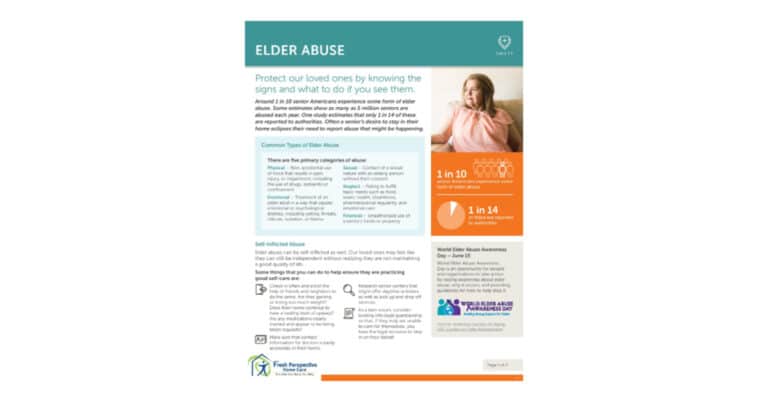Self-Inflicted Abuse
Elder abuse can be self-inflicted as well. Our loved ones may feel like they can still be independent without realizing they are not maintaining a good quality of life.
Some things that you can do to help ensure they are practicing good self-care are:
- Check in often and enlist the help of friends and neighbors to do the same. Are they gaining or losing too much weight? Does their home continue to have a healthy level of upkeep? Are any medications clearly marked and appear to be being taken regularly?
- Make sure that contact information for doctors is easily accessible in their home.
- Research senior centers that might offer daytime activities, as well as pick up and drop off services.
- As a later resort, consider looking into legal guardianship so that, if they truly are unable to care for themselves, you have the legal recourse to step in on their behalf.
World Elder Abuse Awareness Day – June 15
World Elder Abuse Awareness Day is an opportunity for people and organizations to take action by raising awareness about elder abuse, why it occurs, and providing guidelines for how to help stop it.
Source: American Society on Aging, USC Center on Elder Mistreatment
Preventing Elder Abuse & Neglect
If you’re a caregiver and feel you are in danger of hurt or neglect, help is available. Maybe you’re having trouble controlling your anger? Have others raised concern with your behavior? Perhaps you feel disconnected or overwhelmed? Recognizing that you have a problem is the biggest step to getting help and preventing abuse.
Here are some examples to help you prevent elder abuse or neglect:
• Request help from friends, relatives, or local respite care agencies or find an adult daycare program – everyone needs a break.
• Take care of yourself with proper rest, diet, regular exercise, and medical needs.
• Seek help for depression.
• Find a support group for caregivers of the elderly.
• Get help for any substance abuse issues.
• Get professional help such as a therapist.
Source: Helpguide
The Warning Signs
Abusers will rarely abuse your loved one in your presence. Often it can happen in the heat of a moment when there isn’t anyone else around.
However, there are signs that can indicate that abuse might be happening.
• Unexplained bruises, welts, or scars, especially if they appear symmetrically on both sides of the body
• Broken bones, sprains, or dislocations
• Drug overdose or, conversely, signs of medication not being taken
• Dramatic weight loss for no apparent reason
• Broken eyeglasses or other personal assistance devices
• Caregiver’s refusal to let you see your loved one alone
• A home that is in greater disarray than prior to the caretaker’s presence
• Cowering or hiding behavior by your loved one in the presence of their caretaker
• Sudden onset behavior that mimics dementia such as rocking, sucking, or mumbling
Anything that seemingly comes on suddenly and without apparent cause should be investigated.
If You Suspect Abuse
If you believe someone is in immediate danger, call 911 or the local police for immediate help. If you suspect abuse or neglect of someone living in the community, contact your local Adult Protective Services or Long-Term Care Ombudsman.
Source: National Center on Elder Abuse
- How To Help Your Senior Parent Reduce Stress - March 26, 2025
- Celebrating March Birthdays, Anniversaries and New Team Members! - March 11, 2025
- MARCH HIGH FIVE! - March 11, 2025



